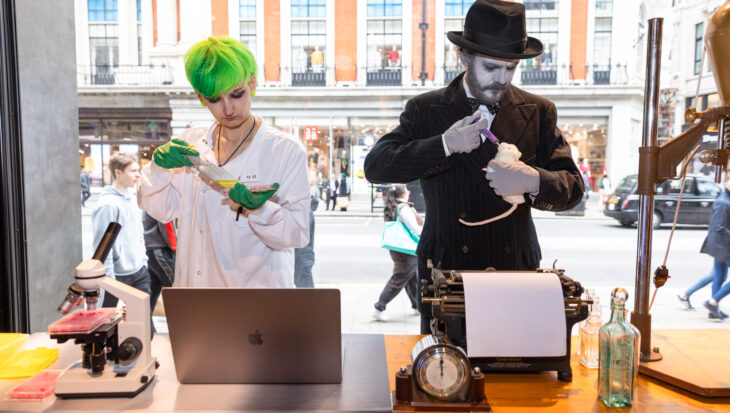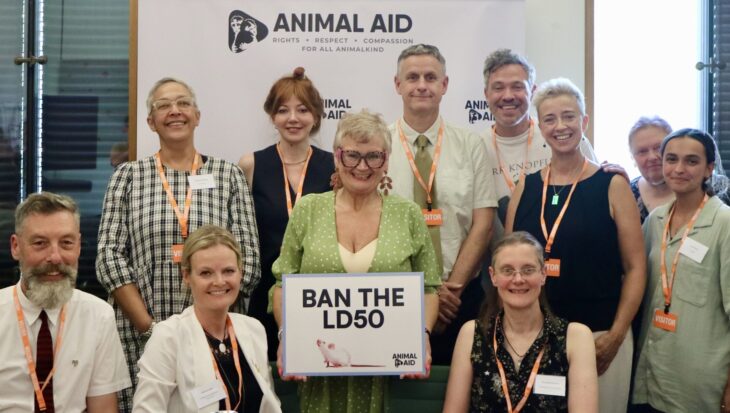In the wake of the government’s decisive move to end hunting with hounds, national campaign group, Animal Aid, has published a shocking dossier making the case for a ban on another major British bloodsport – the mass production of pheasants for ‘sport shooting’.
In Holland, rearing birds so that they can be shot down for pleasure was first curbed in 1986 and outlawed entirely in 2002. The action was taken because the practice was judged to be morally and environmentally unsupportable. Animal Aid, which has produced five major reports on the pheasant killing industry since 2000, argues that the time has come for a Dutch-style ban in Britain. The proposed new Animal Welfare Bill (AWB), the group suggests, is the ideal instrument for following the Dutch lead.
On September 15, Animal Aid’s Director, Andrew Tyler, made the case for a ban before the Parliamentary Select Committee on the Environment, Food and Rural Affairs. The Committee is charged with advising government on the detailed contents of the AWB. A key feature of the draft version of the Bill is the offence of subjecting animals to ‘unnecessary suffering’. Pheasant rearing and shooting, according to Animal Aid’s new report, Fowl Play, comprehensively fail this welfare test.
Fowl Play – and supporting undercover film and still images – reveals, for the first time, the grim lives of breeding pheasants inside a giant, state-of-the-art egg production unit. The unit extends over some two acres and is composed of thousands of tiny metal pens arranged in row upon seemingly endless row. Incarcerated within each pen are six or seven pheasant hens and one pheasant cock. All are fitted with oppressive face masks designed to limit the aggression caused by the crowded conditions. But, despite the masks, many of the birds had been feather-pecked and injured by their cagemates.
Animal Aid makes its prohibition call just as shooting estates across the country prepare for the new four-month pheasant killing season, which starts October 1.
Says Animal Aid Director Andrew Tyler:
“The pheasant industry is where factory farming meets bloodsports. The suffering experienced by these birds, while they are being fattened for the kill and as they repeatedly run the gauntlet of the guns, cannot plausibly be justified as ‘necessary’. Like hunting with hounds, it’s time this grotesque practice was consigned to the history books.”
Notes to Editors
- Every year in Britain, around 35 million pheasants are mass-produced like commercial poultry so that they can be shot down by wealthy ‘guns’, who commonly pay £1,000 per day for the ‘privilege’. In an effort to eliminate the bird-on-bird aggression caused by the crowded conditions in the breeding units, rearing sheds and release pens, gamekeepers fit the pheasants with various devices. These restrict their vision and prevent them from pecking at their cagemates. They even have the ends of their beaks burnt or sliced off.
- Large numbers of pheasants inevitably attract – and, in fact, boost the populations of – predator species such as stoats, weasels, foxes and members of the crow family. Gamekeepers deliberately kill them by setting traps and snares. But species ranging from badgers to cats and dogs – even protected birds of prey like owls and kestrels – are caught and killed. Millions of animals are slaughtered every year in these ‘predator control’ programmes.
- Because of the enfeeblement that results from being reared in sheds, around half of the pheasants die before they can be gunned down. They perish from exposure, starvation, disease, predation, or under the wheels of motor vehicles. And given that a small group of shooters can kill up to 500 birds a day, many of the victims are not actually eaten. According to an editorial in Country Life magazine (February 1, 2001) some of the ‘surplus’ is buried in specially dug holes.
- Added to these casualties are the numerous unretrieved birds who die slowly from their gunshot wounds, out of sight of the guns.
For more information, call Andrew Tyler or Chris Anderson on 01732 364 546.
- A wide range of images showing pheasant production, predator ‘control’ and shooting is available on request.
- We have an ISDN line for broadcast-quality interviews.
- For further background see the pheasant shooting index.

